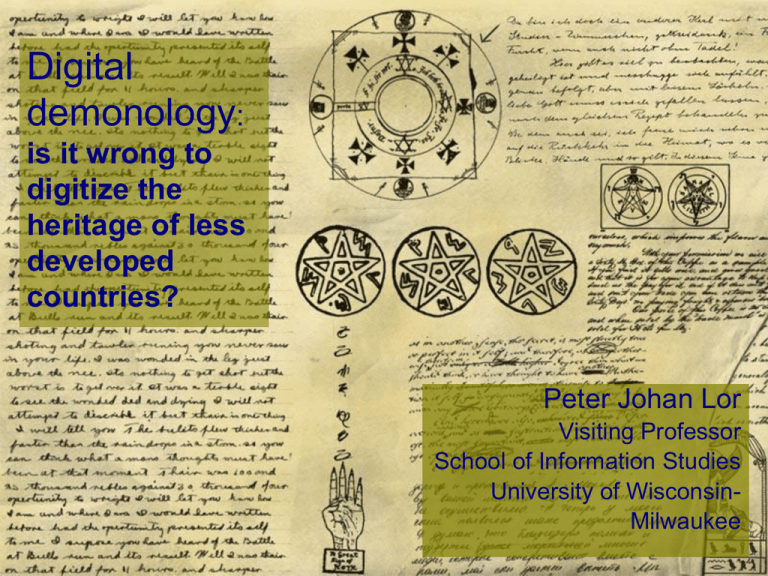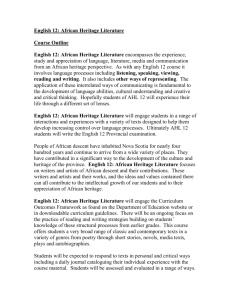Digital demonology : is it wrong to
advertisement

Digital demonology: is it wrong to digitize the heritage of less developed countries? Peter Johan Lor Visiting Professor School of Information Studies University of WisconsinMilwaukee Dabbling With Hannes (J J) Britz, University of Wisconsin, Milwaukee, in: • Information ethics • Political economy of information • Information/knowledge flows – Developing countries – Sub-Saharan Africa – South-North Image: 10000birds.com/the-mallard.htm Outline • Global context of information flows – North-South – South-North – South-South • South-North flows – Six categories – Digitization highlighted • Perceptions: a straw poll • Some ethical considerations North - South Information for development A helping hand Book aid to combat book famine Barriers: Poverty Digital divide Intellectual property South – North Less obvious Lesser volume Diversity More later South – South Overlooked Limited volume Barriers Potentially significant South-North • Focus of this presentation (Examples from Africa) • Knowledge production is not a monopoly of the North – – – – – Centers of Learning: Alexandria, Timbuktu African science Indigenous knowledge Biodiversity, cultural diversity Area studies South-North • South-North information flow characterised by a paradox in attitudes to African knowledge: – Neglect – Exploitation • Seven categories Categories of South-North flows Examples from Africa 1. Scholarly contributions by African scholars 2. Purchase of current African publications 3. Buying up African heritage collections 4. Use of local research resources & informants 5. Indigenous knowledge & biopiracy 6. Brain drain 7. Digitization Category #6: Digitization • Digitization projects – Obvious benefits: preservation & access – But questions raised: who benefits, who controls? – Criticism: neo-colonialist exploitation, paternalism, etc. • How seriously must we take these? Straw poll, June 2010 • • • • Convenience sample (own network) “Typical case” Four questions Sent to: 33 colleagues (personal network of IFLA friends) • Response: 10 Straw poll: response Region Recipients Responses Asia & Oceania 8 2 Latin America & Caribbean 6 1 Middle East & North Africa* 4 2 Sub-Saharan Africa** 16 5 *Responses were from Iran and Afghanistan **South Africa: 7 recipients, 3 responses The “Case” • Project to digitize African archives – – – – – – – Equipment Training Archives to remain in situ Preservation Protection against disasters Free access for assisting institution's clients Cost recovering charge for other users – Free access for assisted institution's clients Question 1 As the Director of Library Q, would you accept this proposal? – Yes: 7 • • • • • – “Since I am in a poor country I have to say 'Yes'.” “For sure.” “I think it's a fair deal where everyone benefits.” “Materials in developing countries are already getting lost at an alarming pace.” The “yes” group includes one highly developed country whose perspective was providing rather than receiving assistance No: 3 Question 2 If you answered “Yes”, did you have any hesitation or reservations? – “Information needs to be freely available for the world to know the accurate information from the primary source” – “If [archives] already open to public [domestic & international] then I will ask for permission from my government and listen to the voice of the people.” – [Problems of local infrastructure and governance cited in detail]... “I am afraid of some foreign organizations that work badly and make the people [hesitant] with all efforts that would be useful. Question 3 If you answered “No”, why? Extensive comments here from 3 respondents, all from South Africa. Issues raised: • • • Copyright: the US partner would hold copyright on the digital files, have full ownership, do whatever they wished with them, charge access fees, with no royalties going to the local partner. “We were horrified.” Lack of full/prompt/clear disclosure of contract conditions More partnership needed, local institution should not be seen only as a “beneficiary” Question 3 (contd) If you answered “No”, why? More issues raised: • • Terms of proposal limited to short term benefit to local party (equipment of limited lifespan, training rapidly obsolete if not refreshed) in exchange for a perpetual right for US party to exploit content commercially Inability of local parties to make full use of the content they have digitized as part of a project. Question 4 If you answered “No”, could the proposal be amended to make it more accessible, and if so, how? – Renegotiate contract, make it more equitable – Local party must have freedom to upload digitized files on own website whenever they can or want. – Material should be free to all, especially for users in other poor countries where difficulties of making payments are serious, even if charges are small. – Digitized material should remain linked to the local institution so that “its role as the original owner is recognized” – Usage of digitized material should be recorded (for use in advocacy, “motivating the significance of the collection with one's management”). Question 4 (contd) If you answered “No”, could the proposal be amended to make it more accessible, and if so, how? – Terms of agreement should be focused not on content but on capacity building. This requires three elements: 1. “[J]oint planning and common access to the identified source of joint funding, rather than mediated funding by the dominant partner.” 2. “[F]ull capacity building across the whole spectrum of infrastructure development, to enable independent growth of local expertise.” 3. “[S]hared content platforms should be Open Access, to avoid complex licensing remuneration of all respective partners.” Some impressions Most respondents find the proposal acceptable. Possible explanations: “Beggars can't be choosers”, we need to do something! Some simply have not thought through the implications. Most of the critical comments came from South Africa. Possible explanations: More extensive experience More politicized environment More politically sophisticated profession Can afford to be “choosy”? A Social Justice approach • Typology of social justice (Britz) • Derived from US National Conference of Catholic Bishops, Economic justice for all (1987) – – – – – – Commutative justice Distributive justice Contributive justice Attributive justice (added later) Retributive justice Transformative justice (added later) Commutative justice • Fundamental fairness in agreements and exchanges between individuals and social groups – Inequalities in economic power or education should not be exploited, e.g. • Biopiracy • cultural looting (buying up of heritage?) – Researchers to report back to communities researched Contributive justice • Twofold prinicple – Individuals have a responsibility to contribute to common good of society – Society must ensure that individuals can contribute • Implications – Africa must contribute its knowledge (scholarly and traditional) – The world must be receptive Attributive justice • Justice as recognition (Britz) – Attributive justice attributes to beings what they are and can claim to be. ... " (Tillich) • Recognise and respect the humanity and autonomy of fellow humans, hence: – Respect integrity of cultural heritage, e.g. in digitisation projects – Recognise Africans as creators – Recognise their right to decide what is done with their heritage (including IK) Transformative justice • Changing existing institutions, behaviours, practices • Rectifying past injustices, compensation for injuries, loss, hence: – Repatriation of looted heritage – Capacity building in developing countries Conclusion • Imbalance in information flows between North and South • Contributions of the South both neglected and exploited • Widespread lack of appreciation of legal and moral implications of digitization programs • True partnerships needed • Capacity building critically important Thank you! Peter Lor lorpj@uwm.edu http://peterlor.com


